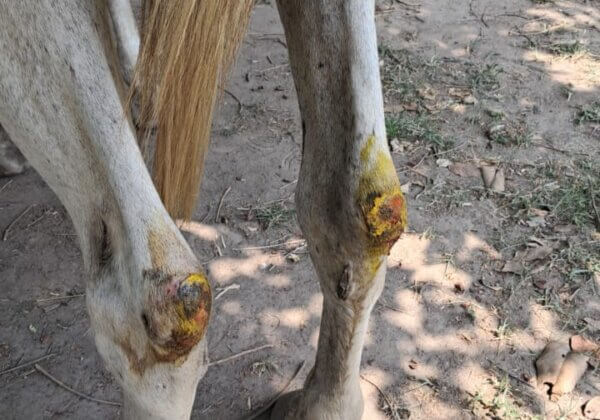Sixth Horse Forced to Pull Carriage in Kolkata Drops Dead, PETA India Demands Change to Electric Vehicles
In a recent incident of which police took cognisance in the first week of October, a horse forced to haul a tourist carriage dropped dead in front of police and the public, causing panic and traffic chaos near Chandni Chowk metro station gate number 3 in Kolkata. The tragedy, which occurred on 29 September, takes the count to six horses who have been worked to death in Kolkata by the carriage industry in recent months.
In another harrowing incident in August, a 2-year-old horse became impaled on a fence at the Maidan, reportedly as he was trying to access food, and he had to be euthanised because his intestines were spilling out of his body.
View this post on Instagram
PETA India says the deaths highlight the urgent need for Kolkata to follow Mumbai’s lead by replacing horse-drawn carriages with heritage-style electric vehicles, which are now preferred by Mumbai’s former horse carriage drivers.
The use of horse-drawn carriages in Kolkata has left horses injured, diseased, and malnourished and caused traffic accidents.
Join us in asking that the use of horses be replaced with eco-friendly electronic carriages: https://t.co/JlR778Za5C pic.twitter.com/CRi1kWuptt
— PETA India (@PetaIndia) September 10, 2022
On 29 September, the visibly emaciated and malnourished horse struggled to pull a carriage, collapsed, and ultimately succumbed to their poor condition on the road. This distressing case prompted action by a local animal rights activist, who filed a complaint with Bowbazar police station under provisions of the Indian Penal Code, 1860, and The Prevention of Cruelty to Animals Act, 1960.
Additionally, in May, the Calcutta High Court ordered that 16 horses identified as “unfit” by the Animal Resources Development Department, West Bengal, during a medical inspection camp that was conducted in accordance with an order of the court be handed over to PETA India for interim care. Yet to date, only nine horses have been transferred to the group, including one who was in such poor shape that she remained largely recumbent upon arrival at a sanctuary and died shortly afterwards. Of the other horses placed under PETA India’s care, some are totally blind, others are visually impaired, and all are suffering from irreversible leg conditions from being forced to work on hard roads – and one of the horses immediately gave birth.
Another horse who was found abandoned, likely after use by the carriage industry, was in such a terrible condition that she died upon arrival at the sanctuary. The horse was extremely gaunt and in severe pain due to numerous injuries, including a highly infected wound on her hip that rendered her severely lame. Veterinarians also suspected she had chronic Surra, a parasitic disease with an almost certain (80% to 100%) fatality rate in horses.
Shockingly, two more of the horses who were not handed over to PETA India died, as recorded in a Calcutta High Court order dated 6 June 2023, within just a month of being identified as unfit. PETA India points out that this indicates the other horses included in the order, who are believed to be still plying despite being identified as unfit, and other unfit horses are also being worked almost to death.
Earlier this year, after seeing the plight of horses used for hauling tourist carriages in Kolkata or reviewing materials regarding their condition, over 150 veterinarians sent an appeal to Chief Minister of West Bengal Mamata Banerjee requesting that her government end the use of horse-drawn carriages in consideration of the animals’ poor health and deteriorated condition.
PETA India has repeatedly written to West Bengal authorities pleading with them to spare horses more suffering, and through public interest litigation, the group hopes the Calcutta High Court will prohibit the use of horses for hauling carriages in the city. In Mumbai, horse-drawn carriages have been replaced with sleek, vintage-style, non-animal vehicles.
Help Us End the Use of Cruel Horse Carriages in Kolkata









